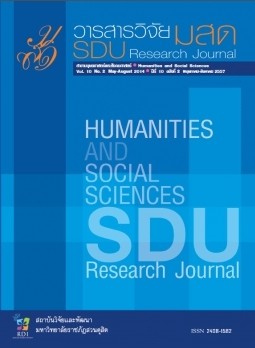การวิเคราะห์ปัจจัยจิตลักษณะและปัจจัยสถานการณ์ที่มีต่อพฤติกรรมการใช้อีเลิร์นนิง ของนักศึกษาระดับปริญญาตรี มหาวิทยาลัยสวนดุสิต
Keywords:
E-Learning Usage, Situational Factor, Behavioral FactorAbstract
This research aimed to study psychological and situational factors as well as the
relationship between the two factors towards e-Learning usage of undergraduate students at Suan Dusit University. The sample was comprised of 390 undergraduate students of Suan Dusit University attending during the second semester of the 2015 academic year; a multi-stage sampling approach was used. The research instrument consisted of questionnaire to measure psychological factors, situational factors, and e-learning usage. The reliability of a questionnaire focused on psychological factors ranged from .908 and .935, the questionnaire focused on situational factors ranged from .907 and .930, and the questionnaire focused on student e-Learning usage ranged from .915 and .960. The statistics used canonical correlation analysis to analyze the findings, which are summarized below. 1) Based on statistics, the psychological and situational factors and student e-Learning usage of students were at high levels. 2) Canonical correlation of psychological and
situational factors and student e-Learning usage equaled .896, .410, .313, .171, .127 and .105, respectively. Functions 1 to 3 were associated with a statistically significant level of .01 and function 4 was related to the level of statistical significance of .05. Function 5 and function 6 showed no statistically significant relationship. 3) The canonical correlation evaluation of psychological and situational factors and student e-Learning usage are involve to each other by 4 functions. All of the 4 functions showed causal relationships with the independent
variables of psychological and situational factors and the dependent variables of e-Learning usage.
References
การประชุมวิชาการมหาวิทยาลัยกรุงเทพ, 151-159. ดวงเดือน พันธุมนาวิน. (2548). การวิจัยทางพฤติกรรมศาสตร์เพื่อการพัฒนาบุคคลและสังคม. ในเอกสาร ประกอบการประชุมปฏิบัติการเรื่องการใช้และการผลิตผลงานวิจัยทางจิตพฤติกรรมศาสตร์ เพื่อประโยชน์แก่สังคมไทย. กรุงเทพมหานคร: โครงการวิจัยแม่บท: การวิจัยและพัฒนาระบบ พฤติกรรมไทย สำนักงานคณะกรรมการวิจัยแห่งชาติ. ดุจเดือน พันธุมนาวิน. (2550). การสังเคราะห์งานวิจัยเกี่ยวกับคุณธรรมจริยธรรมในประเทศไทยและต่าง ประเทศ. กรุงเทพมหานคร: ศูนย์ส่งเสริมแลทัศนีย์ รอดมั่นคง ปณิตา วรรณพิรุณ และณมน จีรังสุวรรณ. (2556). การประกันคุณภาพ e-Learning: จาก ทฤษฎีสู่การปฏิบัติ. วารสารศึกษาศาสตร์, 24(3), 15-24. ธีระ กุลสวัสดิ์. (2557). การยอมรับ e-Learning ของนิสิตระดับปริญญาตรีในมหาวิทยาลัยบูรพา. วารสาร วิชาการ Veridian E-Journal ฉบับมนุษยศาสตร์สังคมศาสตร์และศิลปะ, 7(1), 308-320. ภัทรดร จั้นวันดี. (2557). การศึกษาทัศนคติและความพึงพอใจของนักศึกษามหาวิทยาลัยราชภัฏสกลนคร เกย่ีวกบัการนา�ระบบ E - learning มาใชใ้นการจดัการเรยีนการสอน. การประชมุวชิาการมหาสารคาม วิจัยครั้งที่ 10, 46-53. วิจารณ์ พานิช. (2556). การสร้างการเรียนรู้สู่ศตวรรษที่ 21. กรุงเทพมหานคร: มูลนิธิสยามกัมมาจล. วิไลลักษณ์ เสรีตระกูล. (2550). การสังเกตการณ์ระยะยาวของการยอมรับ e-Learning กรณีศึกษา: นักศึกษา ระดับปริญญาตรีมหาวิทยาลัยกรุงเทพ. สืบค้นเมื่อ 31 มกราคม 2559, สืบค้นจาก http://www. bu.ac.th/knowledgecenter/epaper/jan_june2007/Wilailuk.pdf. สุธา เหลือลมัย. (2547). สวนดุสิตพร้อมแล้วส�าหรับ e-Learning. วารสารสวนดุสิต, 1(4), 29-31. สารสนเทศอุดมศึกษา ส�านักงานคณะกรรมการการอุดมศึกษา. (2559). ข้อมูลสถิติการศึกษา. สืบค้นเมื่อ 31 มกราคม 2559, สืบค้นจาก http://www.info.mua.go.th/information/show_all_statdata_table.php?data_show=2. Watkins, R., Leigh, D. & Triner, D. (2004). Assessing Readiness for E-Learning. Performance Improvement Quarterly, 17(4), 66-79. Yamane, T. (1973). Statistics: An Introductory Analysis. New York: Harper and Row. Translated Thai References Ariyapitipund, C. & Tawaro, P. (2013). Factors Affecting the Internet Using Behaviors of Students Who Enrolled in Introduction to Business Computing Subject. Bangkok University Research Conference, 151-159. (in Thai) Bhanthumnavin, D. (2004). Behavioural Science Research for Personal and Social Development. In the Handbook Workshop the Use and Production of Psychosocial Research for the Benefit of Thai Society. Bangkok: Master Research Program: National Research Council of Thailand. (in Thai) Bhanthumnavin, D. (2007). Synthesis of Ethical and Moral Research in Thailand and Foreign. Bangkok: Moral Promotion Center Office of Knowledge Management and Development (Public Organization). (in Thai)Busabong, C. (2017). Development of an E-Learning Environment Lesson on Personality
Development in Home Economics Careers for Hearing Impaired Undergraduate
Students, Suan Dusit University. SDU Research Journal Humanities and Social Sciences, 13(2). (in Thai) Chareonwongsak, K. (2560). New Graduates Overflow the Labor Market. Retrieved January 16, 2016, from http://www.kriengsak.com/node/767. (in Thai) Jaroensook, K. (2013). Factors Affecting Use of E-Learning Technology by Pre-Degree Students at Ramkhamhaeng University. (Master’s Thesis). Ramkhamhaeng University, Bangkok. (in Thai) Jitsupa, J., Nilsook, P. & Songsom, N. (2013). E-Learning Readiness of Undergraduate Students in Information Technology. National e-Learning Conference 2013, 459-464. (in Thai) Jitsupa, J., Songsom, N. & Nilsook, P. (2014). E-Learning Readiness of Undergraduate Students in Information Technology. Journal of Industrial Education, 13(2), 66-73. (in Thai) Junwandee, P. (2014). Attitude and Satisfaction of Students Sakon Nakhon Rajabhat University on the System E-learning Used for Teaching and Learning. The 10th Mahasarakham University Research Conference, 46-53. (in Thai) Khlaisang, J. (2012). E-Learning Courseware Concept to Practice for E-learning at All Levels. Bangkok: Chulalongkorn University Press. (in Thai) Kulsawat, T. (2014). The Acceptance of E-Learning among Undergraduate Students of
Burapha University. Veridian E-Journal International Humanities, Social Sciences and Arts, 7(1), 308-320. (in Thai) Luealamai, S. (2004). Suan Dusit Ready for E-Learning. Suan Dusit Journal, 1(4), 29-31. Ministry of Education. (2016). 21st Century Learning. Retrieved January 31, 2016, from http:// www.moe.go.th/moe/th/news/detail.php?NewsID=38880&Key=news_research. (in Thai) Office of the Higher Education Commission. (2016). Education Statistics. Retrieved January 31, 2016, from http://www.info.mua.go.th/information/show_all_statdata_table. php?data_show=2. (in Thai) Panit, W. (2013). Creating 21st Century Learning. Bangkok: The Siam Commercial Foundations. (in Thai) Rodmunkong, T., Wannapiroon, P. & Jeerungsuwan, N. (2013). E-Learning Quality Assurance: Theory to Practice. Journal of Education, 24(3), 15-24. (in Thai)Sereetrakul, W. (2007). A Longitudinal Investigation of E-Learning Adoption: Case Study in Bangkok University Undergraduate Students. Retrieved January 31, 2016, From http://www.bu.ac.th/knowledgecenter/epaper/jan_june2007/Wilailuk.pdf. (in Thai)








